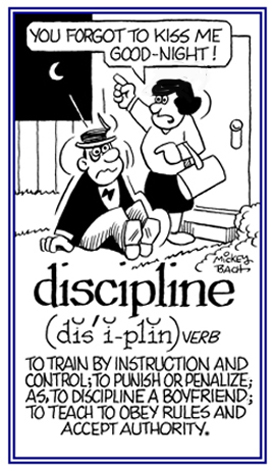You searched for:
“disciplines”
1. The practice or methods of ensuring that people obey rules by teaching them to do so and punishing them if they do not.
2. A controlled orderly state; especially, in a class of school children.
3. The ability to behave in a controlled and calm way even in a difficult or stressful situation.
4. Mental self-control used in directing or changing behavior, learning something, or training for something.
5. A branch of instruction or education; a department of learning or knowledge; a science or art in its educational aspect; a subject or field or activity, e.g., an academic subject.
6. Instruction having for its aim to form the pupil to proper conduct and action; the training of scholars or subordinates to proper and orderly action by instructing and exercising them in the same; mental and moral training; also used figuratively of the training effect of experience, adversity, etc.
7. The order maintained and observed among pupils, or other persons under control or command; such as, soldiers, sailors, the inmates of a religious house, a prison, etc.
8. Etymology: from Latin discipulus, "pupil", from discipere, "to grasp intellectually, to analyze thoroughly"; from dis-, "apart" + capere, "to take".
2. A controlled orderly state; especially, in a class of school children.
3. The ability to behave in a controlled and calm way even in a difficult or stressful situation.
4. Mental self-control used in directing or changing behavior, learning something, or training for something.
5. A branch of instruction or education; a department of learning or knowledge; a science or art in its educational aspect; a subject or field or activity, e.g., an academic subject.
6. Instruction having for its aim to form the pupil to proper conduct and action; the training of scholars or subordinates to proper and orderly action by instructing and exercising them in the same; mental and moral training; also used figuratively of the training effect of experience, adversity, etc.
7. The order maintained and observed among pupils, or other persons under control or command; such as, soldiers, sailors, the inmates of a religious house, a prison, etc.
8. Etymology: from Latin discipulus, "pupil", from discipere, "to grasp intellectually, to analyze thoroughly"; from dis-, "apart" + capere, "to take".
discipline (verb), disciplines; disciplined; disciplining
1. To punish someone as a way of making sure that certain rules or orders are obeyed: The soldier was being disciplined for not following the commands of his captain.
2. To train oneself to do something by controlling his or her behavior: Sharon said that she was disciplining herself to eat less and to exercise more often.

© ALL rights are reserved.
Go to this Word A Day Revisited Index
2. To train oneself to do something by controlling his or her behavior: Sharon said that she was disciplining herself to eat less and to exercise more often.
The students were determined to discipline themselves by learning at least five new vocabulary words each day and to have the highest scores on the weekly tests that will include those words.

